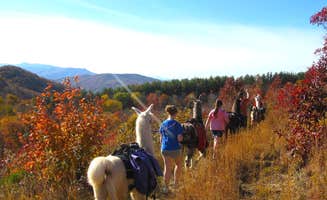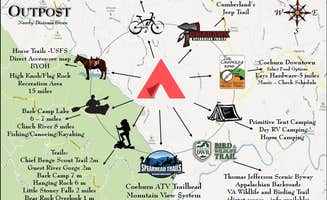Horse campsites in the Johnson City area provide access to Tennessee's portion of the Cherokee National Forest and Appalachian foothills. The region sits at elevations between 1,600-2,200 feet, creating varied trail conditions throughout the seasons. Local equestrian facilities typically operate from March through November when trail conditions are most favorable for riders.
What to do
Trail rides in Jefferson National Forest: Across from Cliffhanger Ranch Adventure Outpost, riders can access Jefferson National Forest for day trips. "The entrance is directly across from the Jefferson National Forrest. There we were able to kayak at Bark Camp Lake which was not busy at all and hike at Little Stoney Falls. Plenty to do and see in this area," notes Noah O.
Explore Warriors' Path State Park: Located near Kingsport, the park offers designated horse paths with water crossings. Cedar Ridge Hammock Campground provides nearby accommodation though it lacks dedicated horse facilities. "The hammock campground is super nice with its setup. However, the shrubbery/trees aren't trimmed well so you're going to fight through branches in some cases to hang your stuff," mentions Justin C.
Visit Blue Ridge Parkway: The scenic drive offers trailer parking and mountain views for day riders. "The trails are just that...trails...heavily traveled trails...so use proper footwear...rocks and roots abound. I'd even recommend trekking poles for sure-footedness and stability," advises Scott K. about paths near Mount Mitchell.
What campers like
Accessible water features: Many equestrian sites feature rivers for horses to cool down after rides. Clinch River Family Campground offers "a launch for tubes/kayaks. At main road there is a public launch if you want to put in there and then float to campground," according to Beth B.
Well-maintained facilities: Clean stables and washdown areas rank high on riders' lists. "The bathrooms and showers are always clean and good taken care of. The camp hosts made sure several times that we had everything we needed," shares Katrin M.
Fire amenities at horse camps: Many equestrian sites prioritize evening comfort. "Each spot has a fire pit with plenty of wood nearby," notes Sheree N. about primitive camping options in the area. More developed sites often include communal fire areas for riders to gather after trail time.
What you should know
Seasonal considerations: Most horse campgrounds in the Johnson City area close during winter months. Black Mountain Campground typically operates "April 13 to October 31" according to site information, though a recent review notes: "FR 472 is closed at the Golf Course and there are hefty fines if you are caught walking beyond the gate. Black Mountain Campground was destroyed by flooding caused by Hurricane Helene."
Road conditions: Many equestrian facilities require navigation on unpaved roads. "Way up the road! It's a nice place once you get here on the narrow country road," notes Mimi about accessing horse facilities.
Water availability: Some camps require bringing your own water for horses. "I recommend packing in enough water for your stay because there is not a water source at the site. Also no cell service," advises Justin Z. about remote riding areas.
Tips for camping with families
Swimming spots for after rides: Look for campgrounds with natural swimming areas to cool off. "There is a swimming hole on the South Toe River in the campground just beyond the end of the riverside sites. It has a small sandy 'beach' area and a neck deep refreshing hole," describes Dave V.
Playgrounds and activities: Some equestrian sites include family amenities. "They have cabins, a nice pool, a blob, lots of outdoor activities, playground area, horse shoes, even with it being a smaller KOA Campground there is a lot to do," explains Laura H. about Bristol-Kingsport KOA.
Budget options: Family-friendly alternatives exist for horse-focused vacations. "Mindful of my budget I learned to ask for a tent site with no electricity, no water, just toilets and showers. The young man who helped me observed I was alone and put me in a small cabin for no additional charge," shares Susan E.
Tips from RVers
Site slope considerations: Many horse campgrounds have terrain issues for larger rigs. "The camp on the west side is Dangerous to drive up in a motorhome. I personally drove my 36' up the most curvy incline I wouldn't recommend anyone to give this a second thought if your not a seasoned driver," warns Debbie O. about navigating Rocky Top Campground.
Cellular reception: Coverage varies significantly across horse camps. "My phone had three bars, Verizon 5G ultra wide signal," reports Timothy F. about connectivity at one campground, while others note complete absence of service: "There is no cell service on T-Mobile or Verizon inside the camp."
Horse trailer parking dimensions: Research sites that accommodate both rig and trailer. "They have several large pull through sites, as well as back in smaller sites. They have 50amp service and full hookup sites," notes a camper about available configurations.



